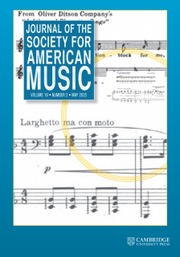The African Diaspora Music Project stands in a long line of research and research tools designed to record the history of African American composition in concert music genres. Black music bibliographies and biographical collections on the subject skyrocketed in the 1980s thanks to scholars such as Eileen Southern, Samuel A. Floyd, Dominique-René de Lerma, and D. Antoinette Handy.Footnote 1 In many ways, their tools laid the foundation for the approaches that current-day musicologists and performers take to conceptualizing musical categories. In the last decade in particular, the torch has been passed from the aforementioned publications to digital databases of Black music that have further democratized access to concert music of the African diaspora and Black music history more generally.
The African Diaspora Music Project (ADMP) was founded in 2019 by vocalist, educator, and scholar Louise Toppin as a resource for students participating in The George Shirley Vocal Competition. The free website is clear and easy to navigate and includes multiple ways to explore the site's content. Selecting a composer's name will take you to their biography and a list of compositions, while selecting a specific piece will lead you to various details about its history and performance. Take, for example, Harry Thacker Burleigh's song “Worthwhile.” Searching entries like this one shows the ADMP at its shining best, because the database currently includes a concentration of entries on vocal repertory. While browsing, a user learns that “Worthwhile” is part of an art song collection titled Five Songs of Lawrence Hope that was published in 1915 by Ricordi. Especially useful to a performer are specifications for tempo, voice type, precise range, accompanying instrument, and whether the work should be sung in dialect, as well as embedded videos of performances.
At the time of this writing, there are 2,465 vocal entries, 1,269 orchestral entries, and 478 non-orchestral instrumental entries (primarily for keyboard instruments). The database can feel overwhelming, but in a wonderfully exciting way. Students of African American music find it disheartening to see the vast world of Black concert music underrepresented, whether presented as miniscule or as too easily digestible. As a student of Black music myself, I want to feel there is a world opening up to me, not one easily reduced to ten pieces. The ADMP accomplishes this not only through the thousands of pieces included, but also through linked sources and curated lists of repertoire.
The latter is one of the strongest aspects of the project because it creates an avenue for dialogue between research, pedagogy, and performance. The inclusion of curated lists was requested by symphony leaders at the National Conference of the League of American Orchestras in 2022, hoping to diversify their programming, after which the ADMP asked nine guest contributors to recommend a selection of orchestral pieces. Each contributor volunteered selections that they enjoyed hearing, conducting, or playing, and their choices are publicly available for those who are not sure where to start, or just want guidance from industry experts.
In order to continue its trajectory of growth, demonstrated over the last five years, the ADMP will rely on crowd-sourced entries that are managed by a group of contributing editors. I appreciate that the ADMP classifies itself as a “project” because completeness is a rapidly moving target. The upkeep of a resource of this magnitude involves a massive undertaking, not just because the existing information will require further editing, but because the repository's format suggests a level of comprehensiveness not yet achieved. As I was exploring the ADMP, I looked at the page for violinist and composer Jessie Montgomery. Although her page has no instrumental repertoire listed, her website lists five pieces for solo instruments and many others for various ensembles. Admittedly, her works were easy to find on my own, but their absence from the ADMP suggests they don't exist. This is an issue caused by the site's design and, needless to say, is one that doesn't align with the ADMP's stated goals. To make the most of what the ADMP offers at present, users must pursue their own paths of inquiry in tandem with utilizing the ADMP's repository.
Although the ADMP provides notable support to performers, it is not as pedagogically useful to those in the humanities. The good news is that should future editors want to include information specifically geared toward humanistic research, the site appears well equipped to handle the expansion that would require. For music historians, this might mean including secondary literature that addresses a given piece or composer. It could also mean compiling entries on scholars who work on Black concert music to once again encourage communication pathways between the various byways and subfields of music studies. The ADMP states that one of its goals is to “encourage research, exploration, and performance” of concert music of the African diaspora. It greatly succeeds as a launchpad for further research, particularly for performers, because it is accessible, continuously growing, and managed by a team of musicians that is passionate about Black music.
Reed Williams is a musicologist and pianist pursuing her Ph.D. in music history at the University of Chicago. She is passionate about American Black music history and historiography, particularly in twentieth-century urban centers. Her current interests center around the musical networks, spaces, and voices of the Great Migration, especially within Chicago.


